Module 11 Unit 3 Language in use (3) 课件(共有PPT22张)
文档属性
| 名称 | Module 11 Unit 3 Language in use (3) 课件(共有PPT22张) |

|
|
| 格式 | pptx | ||
| 文件大小 | 12.4MB | ||
| 资源类型 | 教案 | ||
| 版本资源 | 外研版 | ||
| 科目 | 英语 | ||
| 更新时间 | 2022-04-23 20:57:00 | ||
图片预览

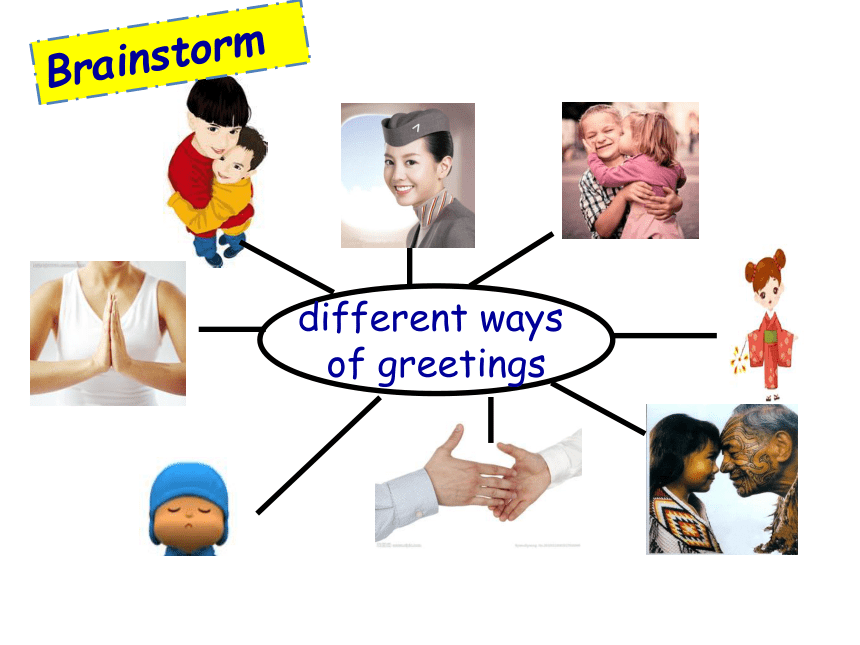
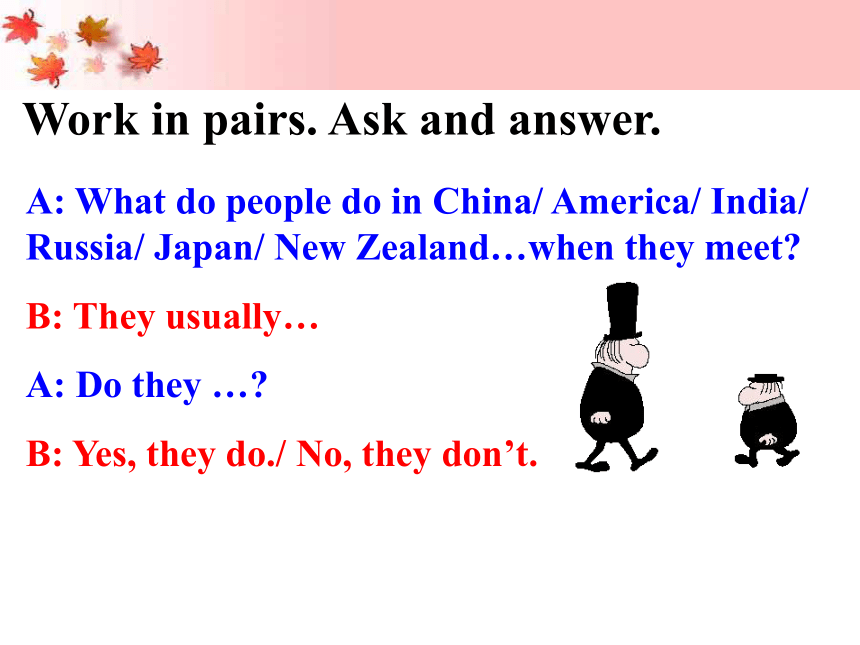
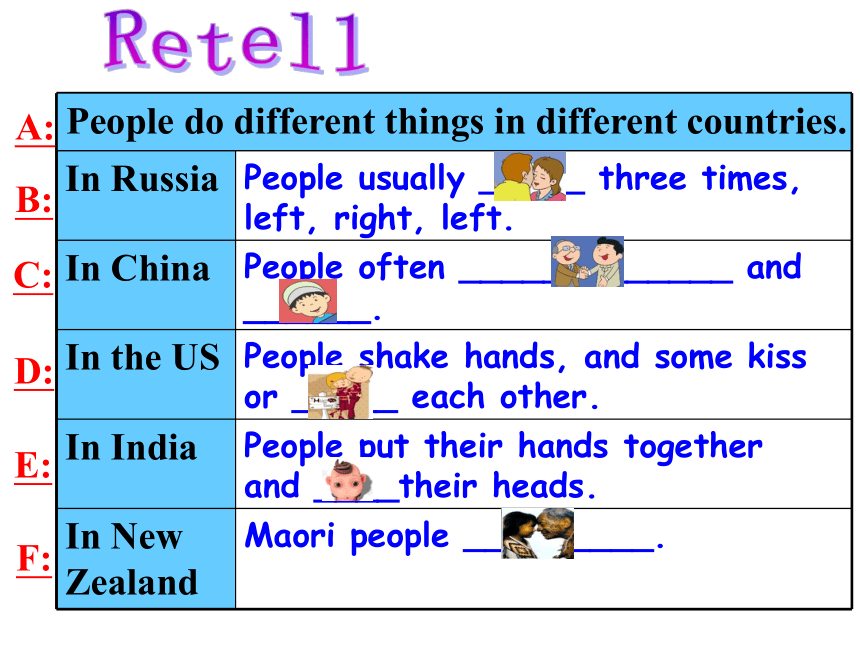
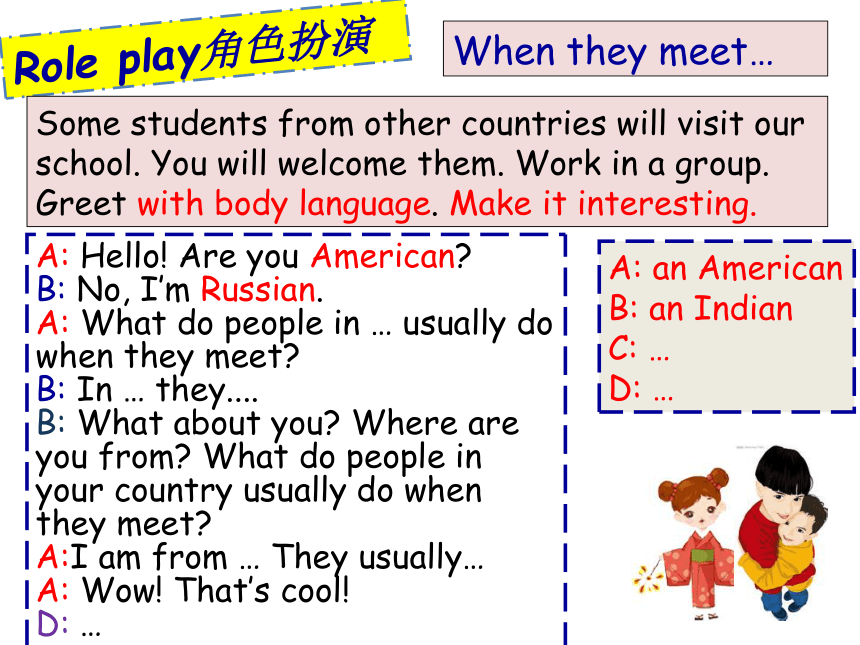
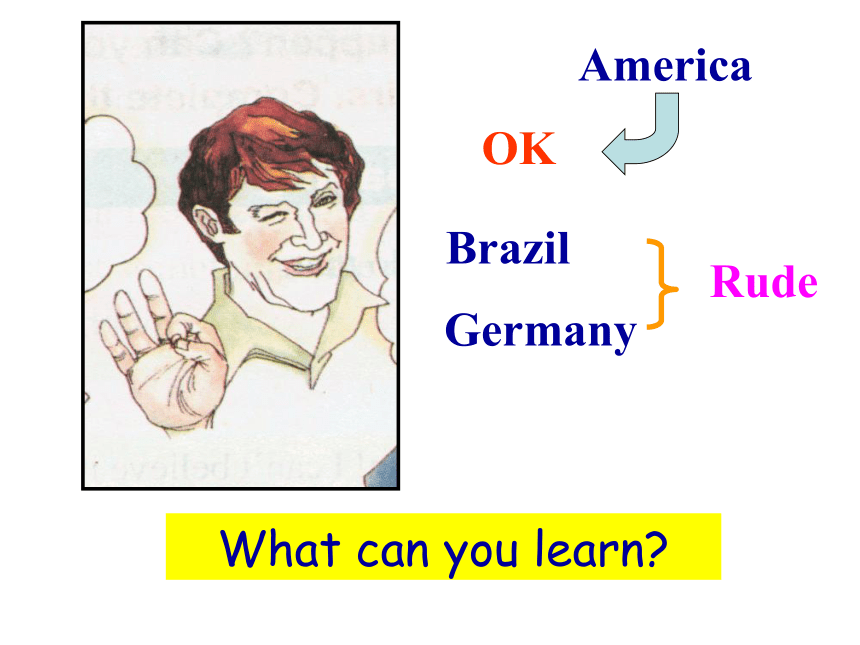
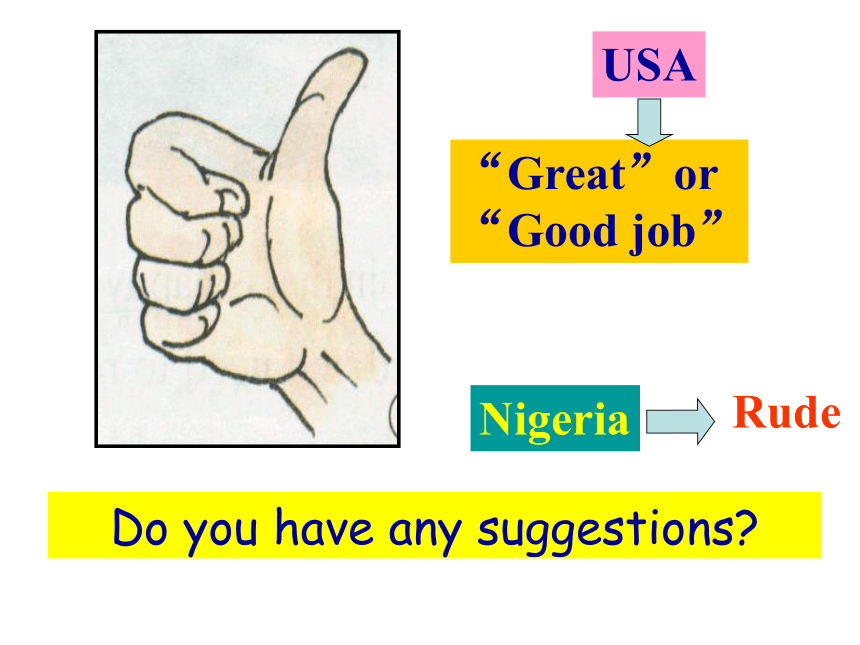

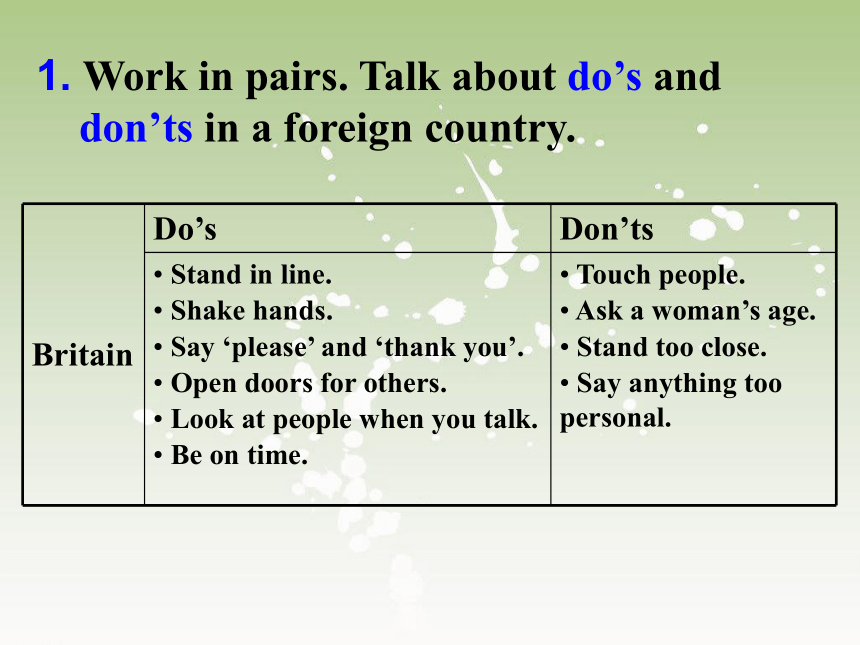
文档简介
(共22张PPT)
Unit3 Language in use
Module11 Body Language
different ways
of greetings
Brainstorm
A: What do people do in China/ America/ India/ Russia/ Japan/ New Zealand…when they meet
B: They usually…
A: Do they …
B: Yes, they do./ No, they don’t.
Work in pairs. Ask and answer.
In Russia People usually _____ three times, left, right, left.
In China People often _____________ and ______.
In the US People shake hands, and some kiss or _____ each other.
In India People put their hands together and ____their heads.
In New Zealand Maori people _________.
Retell
People do different things in different countries.
A:
B:
C:
D:
E:
F:
Role play角色扮演
Some students from other countries will visit our school. You will welcome them. Work in a group. Greet with body language. Make it interesting.
A: Hello! Are you American
B: No, I’m Russian.
A: What do people in … usually do when they meet
B: In … they....
B: What about you Where are you from What do people in your country usually do when they meet
A:I am from … They usually…
A: Wow! That’s cool!
D: …
When they meet…
A: an American
B: an Indian
C: …
D: …
America
OK
Brazil
Germany
Rude
What can you learn
“Great”or “Good job”
USA
Nigeria
Rude
Do you have any suggestions
America
Victory
Britain
Most of the world
Middle East
Rude
Do you have any suggestions
1. Work in pairs. Talk about do’s and
don’ts in a foreign country.
Britain Do’s Don’ts
Stand in line. Shake hands. Say ‘please’ and ‘thank you’. Open doors for others. Look at people when you talk. Be on time. Touch people.
Ask a woman’s age.
Stand too close.
Say anything too personal.
on the road
in class
in the dining room
2. Make a list of do’s and don’ts in class, in the dining room and on the road…
Stand in line.
Don’t touch people when you
talk to them.
…
in class
1. Be quiet.
2. Take notes.
3. Listen to the teacher carefully.
4. Don’t eat in class.
…….
on the road
Walk on the zebra crossing.
2. Be careful.
3. Don’t play football.
4. Don’t run fast.
……
in the dining room
Line up.
2. Don’t push.
3. Don’t make noise.
4. Don’t waste food.
……
Enjoy reading.
When you wave to a friend, you are using body language. When you smile at someone you mean to be friendly. When you put one finger in front of your mouth, you mean “ Be quiet. ”
Yet, people in different countries may use different body languages.
Reading part
1.What do you mean if you put one finger in front of your mouth
2.What body language can you use if you want to show you’re friendly
3.What body language do you use when you say goodbye
Questions
It means “Be quiet!”
Smile at somesone.
We wave to a friend.
Once an Englishman was in Italy. He could speak little Italian. One day while he was walking in the street, he felt hungry and went into a restaurant. When the waiter came, the Englishman opened his mouth, put his fingers into it and took them out again and moved his lips. In this way, he meant to say, “ Bring me something to eat.” But the waiter brought him a lot of things to drink, first tea, then coffee then milk, but no food.
1.Why did the Englishman go to a restaurant
2.The Englishman wanted to eat something. What did he do
3.Did the waiter bring food to the Englishman Why
Questions
Because he felt hungry.
The Englishman opened his mouth, put his fingers
into it and took them out again and moved his lips.
No, he didn’t.
Because he misunderstood the Englishman’s body language.
The Englishman was sorry that was not able to tell the waiter he was hungry. He was ready to leave the restaurant when another man came in. The man put his hands on his stomach, and this body language was good enough for the waiter. In a few minutes, the waiter brought him a large plate of bread and meat.
Finally the Englishman had his meal in the same way.
How many persons were mentioned in this story
2.Why did the Englishman feel sorry at first
3.Did the Englishman have the meal finally
Questions
Three
Because he wasn’t able to tell the waiter he was
hungry.
Yes, he did.
Body language is very important in our daily life, and it may vary from different cultures. When we are visiting other countries, we should follow their customs. That is to say, _________________________.
When in Rome, do as the Romans do.
入乡随俗
What can you learn from this story
Summary
Homework
1.Make a poster about body
language.
2.Search more information about
world culture of greetings.
3.Finish off the exercises of this unit.
A smile is the most beautiful language
in the world! 微笑是世上最美的语言。
Unit3 Language in use
Module11 Body Language
different ways
of greetings
Brainstorm
A: What do people do in China/ America/ India/ Russia/ Japan/ New Zealand…when they meet
B: They usually…
A: Do they …
B: Yes, they do./ No, they don’t.
Work in pairs. Ask and answer.
In Russia People usually _____ three times, left, right, left.
In China People often _____________ and ______.
In the US People shake hands, and some kiss or _____ each other.
In India People put their hands together and ____their heads.
In New Zealand Maori people _________.
Retell
People do different things in different countries.
A:
B:
C:
D:
E:
F:
Role play角色扮演
Some students from other countries will visit our school. You will welcome them. Work in a group. Greet with body language. Make it interesting.
A: Hello! Are you American
B: No, I’m Russian.
A: What do people in … usually do when they meet
B: In … they....
B: What about you Where are you from What do people in your country usually do when they meet
A:I am from … They usually…
A: Wow! That’s cool!
D: …
When they meet…
A: an American
B: an Indian
C: …
D: …
America
OK
Brazil
Germany
Rude
What can you learn
“Great”or “Good job”
USA
Nigeria
Rude
Do you have any suggestions
America
Victory
Britain
Most of the world
Middle East
Rude
Do you have any suggestions
1. Work in pairs. Talk about do’s and
don’ts in a foreign country.
Britain Do’s Don’ts
Stand in line. Shake hands. Say ‘please’ and ‘thank you’. Open doors for others. Look at people when you talk. Be on time. Touch people.
Ask a woman’s age.
Stand too close.
Say anything too personal.
on the road
in class
in the dining room
2. Make a list of do’s and don’ts in class, in the dining room and on the road…
Stand in line.
Don’t touch people when you
talk to them.
…
in class
1. Be quiet.
2. Take notes.
3. Listen to the teacher carefully.
4. Don’t eat in class.
…….
on the road
Walk on the zebra crossing.
2. Be careful.
3. Don’t play football.
4. Don’t run fast.
……
in the dining room
Line up.
2. Don’t push.
3. Don’t make noise.
4. Don’t waste food.
……
Enjoy reading.
When you wave to a friend, you are using body language. When you smile at someone you mean to be friendly. When you put one finger in front of your mouth, you mean “ Be quiet. ”
Yet, people in different countries may use different body languages.
Reading part
1.What do you mean if you put one finger in front of your mouth
2.What body language can you use if you want to show you’re friendly
3.What body language do you use when you say goodbye
Questions
It means “Be quiet!”
Smile at somesone.
We wave to a friend.
Once an Englishman was in Italy. He could speak little Italian. One day while he was walking in the street, he felt hungry and went into a restaurant. When the waiter came, the Englishman opened his mouth, put his fingers into it and took them out again and moved his lips. In this way, he meant to say, “ Bring me something to eat.” But the waiter brought him a lot of things to drink, first tea, then coffee then milk, but no food.
1.Why did the Englishman go to a restaurant
2.The Englishman wanted to eat something. What did he do
3.Did the waiter bring food to the Englishman Why
Questions
Because he felt hungry.
The Englishman opened his mouth, put his fingers
into it and took them out again and moved his lips.
No, he didn’t.
Because he misunderstood the Englishman’s body language.
The Englishman was sorry that was not able to tell the waiter he was hungry. He was ready to leave the restaurant when another man came in. The man put his hands on his stomach, and this body language was good enough for the waiter. In a few minutes, the waiter brought him a large plate of bread and meat.
Finally the Englishman had his meal in the same way.
How many persons were mentioned in this story
2.Why did the Englishman feel sorry at first
3.Did the Englishman have the meal finally
Questions
Three
Because he wasn’t able to tell the waiter he was
hungry.
Yes, he did.
Body language is very important in our daily life, and it may vary from different cultures. When we are visiting other countries, we should follow their customs. That is to say, _________________________.
When in Rome, do as the Romans do.
入乡随俗
What can you learn from this story
Summary
Homework
1.Make a poster about body
language.
2.Search more information about
world culture of greetings.
3.Finish off the exercises of this unit.
A smile is the most beautiful language
in the world! 微笑是世上最美的语言。
同课章节目录
- Module 1 Lost and found
- Unit 1 Whose bag is this?
- Unit 2 Are they yours?
- Unit 3 Language in use
- Module 2 What can you do ?
- Unit 1 I can play the piano
- Unit 2 I can run really fast
- Unit 3 Language in use
- Module 3 Making plans
- Unit 1 What are you going to do at the weekends?
- Unit 2 We're going to cheer the players.
- Unit 3 Language in use
- Module 4 Life in the future
- Unit 1 Everyone will study at home
- Unit 2 Every family will have a small plane.
- Unit 3 Language in use
- Module 5 Shopping
- Unit 1 What can I do for you?
- Unit 2 You can buy everything on the Internet
- Unit 3 Language in use
- Module 6 Around town
- Unit 1 Could you tell me how to get to the Nationa
- Unit 2 The London Eye is on your right.
- Unit 3 Language in use
- Revision module A
- Module 7 My past life
- Unit 1 I was born in a small village.
- Unit 2 I was born in Quincy.
- Unit 3 Language in use
- Module 8 Story time
- Unit 1 Once upon a time….
- Unit 2 Goldilocks hurried out of the house.
- Unit 3 Language in use
- Module 9 Life history
- Unit 1 He left school and began work at the age of
- Unit 2 He decided to be an actor.
- Unit 3 Language in use
- Module 10 A holiday journey
- Unit 1 What did you do?
- Unit 2 This morning we took a walk.
- Unit 3 Language in use
- Module 11 Body language
- Unit 1 They touch noses!
- Unit 2 Here are some ways to welcome them.
- Unit 3 Language in use
- Module 12 Western music
- Unit 1 It's so beautiful!
- Unit 2 Vienna is the centre of European classical
- Unit 3 Language in use
- Revision module B
